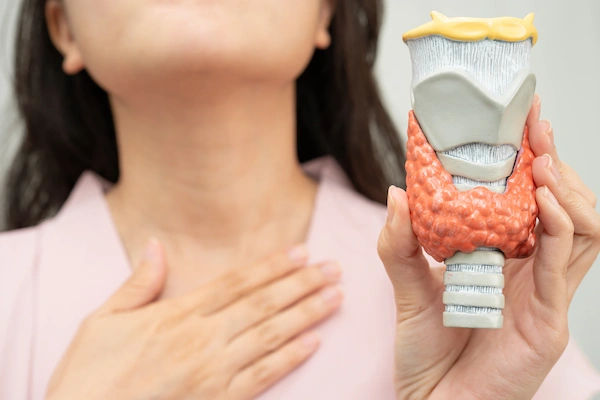Thyroid Health Unlocked: Your Guide to Natural Solutions and Medical Care
Know about the thyroid gland, its function, problems in thyroid, symptoms, causes, foods to eat and avoid, role of nutrients and lifestyle tweaks to a happy thyroid

Written by Dr. Vasanthasree Nair
Reviewed by Dr. Shaik Abdul Kalam MD (Physician)
Last updated on 13th Jan, 2026

Introduction
Feeling constantly drained, struggling with unexplained weight changes, or battling brain fog? You're not alone. These common complaints often point to a tiny, butterfly-shaped gland in your neck: the thyroid. As the body's master regulator, the thyroid gland influences everything from your energy levels and metabolism to your mood and body temperature. When it's out of balance, your entire well-being can feel off-kilter. This comprehensive guide will demystify your thyroid, explore the root causes of imbalance, and provide a clear roadmap of solutions from foundational lifestyle changes to essential medical care.
What Exactly is the Thyroid and What Does It Do?
The thyroid gland may be small, but its role is monumental. Located just below your Adam's apple, it acts as the control centre for your metabolism, dictating how quickly your body uses energy. Think of it as the thermostat for your entire system.
Consult an Endocrinologist for Personalised Advice
The Hormonal Orchestra: Thyroxine (T4) and Triiodothyronine (T3)
The thyroid produces two primary hormones: Thyroxine (T4) and Triiodothyronine (T3). T4 is the inactive "storage" hormone, produced in larger quantities. The real action comes from T3, the active hormone that directly influences your cells. Most T3 is converted from T4 in organs like the liver and kidneys. This conversion is a critical process, and disruptions here are a common hidden cause of symptoms even when standard blood tests appear "normal."
The Feedback Loop: How Your Brain Talks to Your Thyroid
This entire system is governed by a delicate feedback loop. The pituitary gland in your brain acts as the supervisor, releasing Thyroid-Stimulating Hormone (TSH). When thyroid hormone levels are low, the pituitary sends out more TSH, shouting, "Make more hormones!" When levels are sufficient, TSH production drops. This is why TSH is the most common initial thyroid test it's a reflection of your brain's perception of your thyroid function.
Recognising the Signs: Symptoms of a Thyroid Imbalance
Thyroid disorders often manifest slowly, with symptoms mistaken for normal ageing or stress. They primarily fall into two categories: underactive (hypothyroidism) and overactive (hyperthyroidism).
When Things Slow Down: The Tell-Tale Signs of Hypothyroidism
This is the most common thyroid problem. When the gland doesn't produce enough hormones, bodily functions slow down. Key symptoms include:
Persistent fatigue and lethargy
Unexplained weight gain or difficulty losing weight
Feeling cold all the time (cold intolerance)
Brain fog, poor concentration, and memory issues
Dry skin, hair loss, and brittle nails
Depression and low mood
Constipation
Heavy or irregular menstrual periods
When Things Speed Up: The Common Symptoms of Hyperthyroidism
Conversely, an overactive thyroid floods the system with hormones, accelerating bodily processes. Symptoms often include:
Anxiety, nervousness, and irritability
Unexplained weight loss despite an increased appetite
Rapid or irregular heartbeat (palpitations)
Feeling hot and sweating excessively (heat intolerance)
Tremors in the hands
Sleep disturbances
Frequent bowel movements
If you are experiencing a cluster of these symptoms persistently, it is crucial to consult a doctor. You can easily book a consultation with an endocrinologist online via Apollo24|7 for an initial evaluation.
Root Causes: What Really Leads to Thyroid Problems?
Understanding the "why" behind a thyroid issue is the first step toward effective solutions.
Autoimmune Attacks: Hashimoto's and Graves' Disease
Autoimmune disorders are the leading cause of thyroid dysfunction in many parts of the world. In Hashimoto's thyroiditis, the immune system mistakenly attacks and gradually destroys the thyroid gland, leading to hypothyroidism. Graves' disease, on the other hand, involves antibodies that mimic TSH, constantly stimulating the thyroid and causing hyperthyroidism.
The Critical Role of Nutrients: Iodine, Selenium, and Zinc
The thyroid cannot function without specific building blocks.
Iodine: Essential for producing T4 and T3. While deficiency is a cause of hypothyroidism globally (and in certain populations), excess iodine can also trigger or worsen autoimmune thyroid disease.
Selenium: This mineral is crucial for converting T4 to the active T3 hormone and also protects the thyroid gland from oxidative stress. Brazil nuts are an excellent source.
Zinc: Works alongside selenium to support thyroid hormone conversion and receptor function.
The Stress Connection: How Cortisol Wreaks Havoc
Chronic stress elevates the hormone cortisol, which can directly inhibit the conversion of T4 to T3, pushing the body to produce more Reverse T3 (rT3)—an inactive form that blocks thyroid hormone receptors. This is a key reason why stress management is a non-negotiable solution for thyroid health.
Gut Health and Thyroid Function: An Unexpected Link
A healthy gut is vital for thyroid function. About 20% of T4 is converted to T3 in the gut, aided by beneficial bacteria. Furthermore, gut inflammation (often from food sensitivities, dysbiosis, or leaky gut) can trigger or exacerbate autoimmune thyroid conditions like Hashimoto's.
Environmental Toxins and Their Impact
Endocrine-disrupting chemicals (EDCs) like bisphenol-A (BPA) in plastics, pesticides, and heavy metals can interfere with thyroid hormone production, conversion, and signalling. Reducing exposure is a proactive step for thyroid health.
Actionable Solutions for Optimal Thyroid Health
A multi-faceted approach that combines diet, lifestyle, and appropriate medical care offers the best path to balance.
The Thyroid-Friendly Plate: Building a Nutrient-Dense Diet
Focus on whole, anti-inflammatory foods.
Power Foods to Embrace:
Fish and Seafood: Rich in iodine and selenium.
Brazil Nuts: Just 2-3 per day provide a full dose of selenium.
Eggs and Dairy: Provide iodine and tyrosine, an amino acid needed for hormone production.
Colourful Fruits and Vegetables: Packed with antioxidants that combat inflammation.
Bone Broth: Supports gut health with collagen and amino acids.
Foods to Limit or Avoid:
Goitrogens: Found in raw cruciferous vegetables (broccoli, cauliflower, kale) and soy. Cooking significantly reduces their goitrogenic effect, so they are generally safe in cooked moderation for most people, unless you have a known iodine deficiency.
Gluten and Dairy: For individuals with Hashimoto's, these can be common triggers for inflammation and autoimmune activity. An elimination diet can help identify sensitivities.
Processed Foods and Sugar: Drive inflammation and disrupt gut health.
Lifestyle Tweaks for a Happier Thyroid
Stress Management is Non-Negotiable
Incorporate daily practices like meditation, yoga, deep breathing exercises, or walks in nature. This helps lower cortisol levels, supporting better hormone conversion.
The Sweet Spot for Exercise
While intense, prolonged exercise can be stressful on the body (raising cortisol), regular moderate activity is beneficial. Think brisk walking, cycling, swimming, or strength training—activities you enjoy and that leave you energised, not depleted.
Prioritising Sleep for Hormonal Balance
Aim for 7-9 hours of quality sleep per night. Sleep is when your body repairs itself and regulates hormone production, including thyroid hormones.
The Importance of Medical Diagnosis and Treatment
Natural solutions are powerful for support, but they are not a substitute for medical diagnosis and treatment when necessary.
When to See a Doctor: Don't Self-Diagnose
If your symptoms are significantly impacting your quality of life or persist despite lifestyle changes, seek professional help. Self-treating based on symptoms alone can be dangerous, as it may mask other underlying conditions.
Understanding Thyroid Function Tests (TSH, T3, T4, Antibodies)
A proper diagnosis requires comprehensive blood testing. Don't settle for TSH alone. A full panel should include:
TSH
Free T4 and Free T3 (the active, unbound forms of the hormones)
Thyroid Antibodies (TPO and TgAb) to check for autoimmune activity.
Apollo24|7 offers convenient home collection for a wide range of tests, including comprehensive thyroid panels, so you can get tested without leaving your home.
Conclusion
Navigating thyroid health can feel complex, but it's a journey of empowerment. By understanding the gland's critical role, recognising the signs of imbalance, and addressing the root causes from nutrient status to stress levels, you take active control of your well-being. Remember, there is no one-size-fits-all solution. What works brilliantly for one person may need adjustment for another. Listen to your body, partner with a knowledgeable healthcare provider, and use the strategies outlined here to support your thyroid, so it can continue to support you in living a vibrant, healthy life. If your condition does not improve after trying these methods, consider booking a physical visit to an endocrinologist with Apollo24|7 for a personalised treatment plan.
Consult an Endocrinologist for Personalised Advice
Consult an Endocrinologist for Personalised Advice

Dr. Anand Ravi
General Physician
2 Years • MBBS
Bengaluru
PRESTIGE SHANTHINIKETAN - SOCIETY CLINIC, Bengaluru

Dr. E Prabhakar Sastry
General Physician/ Internal Medicine Specialist
40 Years • MD(Internal Medicine)
Manikonda Jagir
Apollo Clinic, Manikonda, Manikonda Jagir
(175+ Patients)

Dr. Arunava Ghosh
General Physician/ Internal Medicine Specialist
10 Years • MBBS,MD(GENL.MED.),DM(ENDOCRINOLOGY)
Kolkata
VDC Clinic, Kolkata

Dr. Shruthi B
Endocrinologist
20 Years • MBBS,MD ( GEN MED) DM (ENDOCRIONOLOGY)
Bengaluru
Apollo Clinic, JP nagar, Bengaluru

Dr. Chaithanya R
Internal Medicine Specialist Diabetologist
16 Years • MBBS, MD Internal Medicine, Fellowship in Diabetes(UK), CCEBDM(PHFI)
Bangalore
Apollo Clinic Bellandur, Bangalore
(75+ Patients)
More articles from Thyroid
Frequently Asked Questions
1. Can you fix thyroid problems with diet alone?
While a healthy diet is crucial for supporting thyroid function and reducing inflammation, it is rarely sufficient to 'fix' a diagnosed thyroid condition, especially autoimmune ones like Hashimoto's. Diet is a powerful complementary tool used alongside medical treatment, not a replacement for it.
2. What is the best natural supplement for thyroid health?
There is no single 'best' supplement, as needs vary. However, common supportive supplements include selenium (for hormone conversion), vitamin D (often deficient in autoimmune disease), and zinc. It's vital to have your levels tested and work with a doctor before starting any supplementation, as excess can be harmful.
3. Are thyroid problems hereditary?
Yes, there is a strong genetic component to autoimmune thyroid diseases like Hashimoto's and Graves'. If you have a close family member with a thyroid condition, your risk is higher, making proactive thyroid health awareness even more important.
4. Can stress really cause a thyroid disorder?
While stress may not be the sole cause, it is a significant trigger and exacerbating factor. Chronic stress can disrupt the HPA axis (the brain-adrenal connection), leading to hormonal imbalances that impair thyroid function and can trigger autoimmune flares.
5. What's the difference between Hypothyroidism and Hashimoto's?
Hypothyroidism is the condition of having an underactive thyroid. Hashimoto's thyroiditis is the most common cause of that condition. You can have hypothyroidism from other causes (like iodine deficiency), but most cases in iodine-sufficient regions are due to Hashimoto's.

